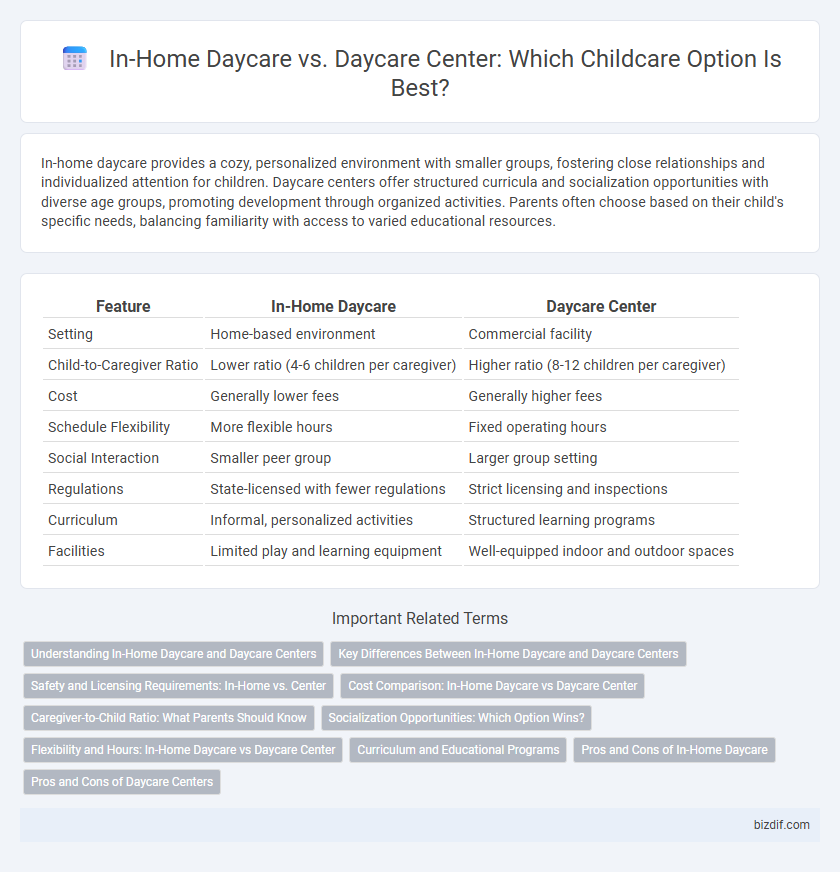In-home daycare provides a cozy, personalized environment with smaller groups, fostering close relationships and individualized attention for children. Daycare centers offer structured curricula and socialization opportunities with diverse age groups, promoting development through organized activities. Parents often choose based on their child's specific needs, balancing familiarity with access to varied educational resources.
Table of Comparison
| Feature | In-Home Daycare | Daycare Center |
|---|---|---|
| Setting | Home-based environment | Commercial facility |
| Child-to-Caregiver Ratio | Lower ratio (4-6 children per caregiver) | Higher ratio (8-12 children per caregiver) |
| Cost | Generally lower fees | Generally higher fees |
| Schedule Flexibility | More flexible hours | Fixed operating hours |
| Social Interaction | Smaller peer group | Larger group setting |
| Regulations | State-licensed with fewer regulations | Strict licensing and inspections |
| Curriculum | Informal, personalized activities | Structured learning programs |
| Facilities | Limited play and learning equipment | Well-equipped indoor and outdoor spaces |
Understanding In-Home Daycare and Daycare Centers
In-home daycare provides a smaller, more personalized setting where caregivers often care for fewer children in a residential environment, fostering close relationships and individualized attention. Daycare centers operate in commercial facilities with structured programs, certified staff, and regulated environments designed to support socialization and early childhood development on a larger scale. Parents choosing between these options should consider factors like caregiver qualifications, environment safety standards, child-to-caregiver ratios, and the child's social needs.
Key Differences Between In-Home Daycare and Daycare Centers
In-home daycare typically offers a smaller, more intimate setting with mixed-age groups, fostering personalized attention and a family-like environment, while daycare centers often provide structured curricula, professional staff, and extensive resources designed for early childhood education. Licensing requirements and regulations vary, with daycare centers subject to stricter state-mandated standards compared to some in-home daycares, which may influence safety and quality oversight. Cost differences are notable, as in-home daycare may be more affordable due to lower overhead, whereas daycare centers often charge higher fees reflecting their facilities and educational programs.
Safety and Licensing Requirements: In-Home vs. Center
In-home daycares often have varying safety and licensing standards depending on state regulations, potentially offering a more personalized but less regulated environment. Daycare centers typically follow stricter licensing requirements, including routine inspections and mandated staff-to-child ratios, ensuring consistent safety protocols. Parents should verify the licensing status and safety measures of both options to make informed decisions regarding child care.
Cost Comparison: In-Home Daycare vs Daycare Center
In-home daycare typically costs 25% to 40% less than traditional daycare centers, making it a more budget-friendly option for many families. Daycare centers often have higher operational expenses, including staff salaries and facility maintenance, which contribute to their increased fees. Parents should weigh the cost savings of in-home daycare against factors like caregiver qualifications and the overall learning environment.
Caregiver-to-Child Ratio: What Parents Should Know
In-home daycare typically offers a lower caregiver-to-child ratio, often ranging from 1:4 to 1:6, which allows for more individualized attention and personalized care. Daycare centers usually have higher ratios, such as 1:8 or 1:10, due to larger group sizes and regulatory requirements. Parents should consider these ratios carefully, as a lower caregiver-to-child ratio can significantly impact their child's safety, development, and overall daycare experience.
Socialization Opportunities: Which Option Wins?
In-home daycare provides a smaller, more intimate setting with limited peer interaction, which may restrict diverse socialization opportunities for children. Daycare centers offer structured group activities and exposure to a larger peer group, promoting enhanced social skills and collaborative play. Research indicates children in daycare centers tend to develop better communication and adaptability due to increased social engagement.
Flexibility and Hours: In-Home Daycare vs Daycare Center
In-home daycare offers greater flexibility with personalized schedules, often accommodating parents who require non-traditional hours or part-time care. Daycare centers typically operate during fixed hours, which may not suit families needing early mornings, evenings, or weekend care. Choosing in-home daycare can provide customized timing that better aligns with diverse family routines and work demands.
Curriculum and Educational Programs
In-home daycare often provides a flexible, personalized curriculum tailored to individual children's needs and interests, fostering a close-knit learning environment. Daycare centers typically offer structured educational programs aligned with state standards and developmental milestones, incorporating group activities and specialized resources. Both settings emphasize early childhood development but differ in scale and curriculum delivery methods.
Pros and Cons of In-Home Daycare
In-home daycare offers a smaller, more personalized environment with typically lower child-to-caregiver ratios, fostering close relationships and consistent care tailored to individual needs. Limited resources and less regulatory oversight may present challenges, potentially affecting the availability of organized activities and specialized facilities found in daycare centers. Flexibility in hours and a home-like atmosphere are key benefits, but parents should consider the caregiver's qualifications and safety protocols when choosing in-home care.
Pros and Cons of Daycare Centers
Daycare centers offer structured environments with certified staff and diverse socialization opportunities, promoting early childhood development and preparation for school. However, they may involve higher costs and less personalized attention compared to in-home daycare settings. Large group sizes can sometimes lead to increased exposure to illnesses and reduced flexibility in scheduling.
In-home daycare vs daycare center Infographic

 bizdif.com
bizdif.com